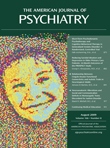To the Editor: We thank Drs. Moore and Cooney for sounding a note of caution about generalizing from our finding that the use of benzodiazepines was associated with an increased risk of suicidal events and self-injury
(1) . Their concerns—that the number of participants who received benzodiazepines was small (N=10) and those who received benzodiazepine may have been treated for symptoms that also increased the risk for suicidal events—are valid. We did adjust for baseline differences between those who received benzodiazepines and those who did not, and our findings persisted. Nevertheless, we recognize the importance of being circumspect about drawing strong inferences from these findings. Perhaps it is useful to restate the concerns that we articulated in the Discussion: “The relationship between the use of benzodiazepines and the occurrence of self-harm events must be interpreted cautiously because of the small number involved, the heavy representation of just one site, and non-random assignment” (
1, p. 424). As per our conclusion, we simply suggested “the need to re-evaluate the risk and benefits of…anti-anxiety agents in treatment-resistant depressed adolescents at high suicidal risk” (
1, p. 424).
We also appreciate the positive observations offered by Dr. Smith about our study
(1,
2) . He articulates the hypothesis that suicidal events are more likely to occur with the use of antidepressants with shorter half-lives, such as paroxetine, sertraline, and citalopram, than with an SSRI with a longer half-life, such as fluoxetine. As per Dr. Smith’s suggestion, we examined our data in the TORDIA study to test this hypothesis.
First, we compared the rate of suicidal events in those withdrawn from fluoxetine to those withdrawn from an SSRI with a shorter half-life (i.e., citalopram, escitalopram, fluvoxamine, paroxetine, or sertraline). There was no difference in the rate of suicidal events in those withdrawn from fluoxetine relative to those withdrawn from an SSRI with a shorter half-life, although there was a trend in the hypothesized direction (9/99 [9.1%] vs. 39/235 [16.6%]; χ 2 =3.19, df=1, p=0.07).
Second, we compared the rate of suicidal events as a function of the medication to which the participants were assigned in TORDIA. There was no difference in the rate of suicidal events among subjects assigned to treatment with paroxetine (3/50 [6.0%]), citalopram (4/34 [11.8%]), fluoxetine (14/84 [16.7%]), or venlafaxine extended release (27/166 [16.3%]) (Fisher’s exact test, p=0.27). Even among those participants switched from shorter half-life SSRIs, there was no difference in the rate of events among those switched to paroxetine (2/24 [8.3%]), citalopram (0/7 [0.0%]), fluoxetine (14/84 [16.7%]), or venlafaxine (23/120 [19.3%]) (Fisher’s exact test, p=0.48).
This conclusion is consistent with findings from the Treatment of Adolescent Depression Study (TADS), which found a higher rate of suicidal events in subjects treated with fluoxetine alone than in those treated with placebo (9.2% vs. 2.7%, p=0.04, odds ratio=3.7, 95% confidence interval, 1.0 to 13.7 [3]). Taken together, the findings from TORDIA and TADS do not support the view that a longer half-life in an antidepressant, as a treatment agent, confers protection against suicidal events, and our results are ambiguous with respect to the effect of the half-life of a drug from which a patient is withdrawn.
The half-life hypothesis, whether related to a prescribed drug or one that is being discontinued, could be further investigated using large administrative data sets, meta-analyses of randomized trials, and prospective randomized trials. We regret that the TORDIA data set could not provide a definitive answer to Dr. Smith’s thought-provoking question.

